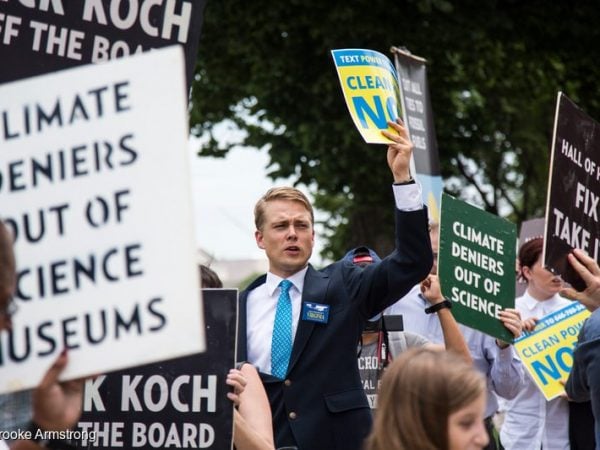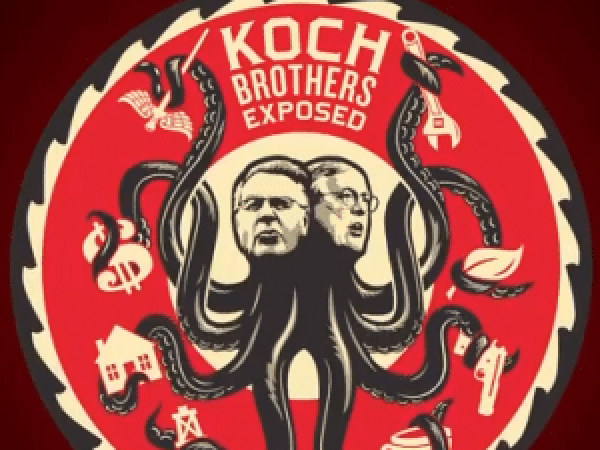
Koch Industries: Company Facts
Koch Industries, Inc. is the second-largest privately-held company in the United States, a conglomerate of more than twenty companies with $115 billion in annual sales. Koch operates in nearly 60 countries, and 100,000 employees globally, "about 60,000" of which are employed in the United States.
Koch Industries, Inc. is the second-largest privately-held company in the United States, a conglomerate of more than twenty companies with $115 billion in annual sales. Koch operates in nearly 60 countries, and 100,000 employees globally, "about 60,000" of which are employed in the United States.
"My joke is that we're the biggest company you've never heard of."
-- David Koch
Koch operates a variety of industrial businesses, predominantly in oil and gas exploration, pipelines and refining, in chemical and fertilizer production, in trading both physical fossil fuel products as well as commodity futures and derivatives, cattle and game ranching, forestry and timber products, electronics, industrial glass and various consumer products.
Koch Industries Primary Subsidiaries:
Flint Hills Resources is Koch's primary oil company, operating major oil refinieries, oil and gas supply stations, pipelines, corn biofuels, chemicals and polymers. Flint Hills' major oil and gas refineries process 670,000 barrels of crude oil daily:
- Minnesota: Koch's Pine Bend refinery in Rosemont, MN can process 339,000 barrels of oil per day, and "is among the top processors of Canadian crude in the United States," complimenting Koch's multi-million acre tar sands leases in Alberta, Canada.
- Texas: Koch's Corpus Christi refineries can process about 300,000 barrels of crude oil per day, and have been upgrading technology in order to capitalize on the Eagle Ford Shaleboom.
- Alaska: Facing "enormous" cleanup costs for soil and groundwater contamination and high crude oil prices, Flint Hills announced in 2014 that it would permanently close its North Pole refinery outside of Fairbanks, Alaska. Koch blames contamination on the refinery's previous owner, Williams Companies. The complex was able to process 85,000 barrels of crude oil each day, producing products like gasoline and especially jet fuel, and can store over 700,000 barrels of crude oil on site.
In 2014, Flint Hills entered a $2.1 billion agreement to buy PetroLogistics in order to convert U.S. shale gas into propylene, a petrochemical used to make plastic.
Georgia-Pacific is Koch's largest subsidiary, producing timber and construction products, paper and pulp, consumer tissue and hygeine products, chemicals, and cellulose. Georgia-Pacifics products include consumer brands like recognizable retail products including Quilted Northern®, Angel Soft®, Brawny®, Vanity Fair® and Dixie® cups.
INVISTA includes consumer products like STAINMASTER carpet, Lycra and Coolmax clothing products, specialty chemicals and polymers, upholstery products for houses and automobiles. In 2009, Barack Obama was sworn in as the 44th United States President on a Koch Industries INVISTA carpet.
Koch Supply and Trading trades physical commodities and derivates, markets Liquified Natural Gas (LNG) and runs a 80,000 barrels-per day Rotterdam refinery in The Netherlands.
Koch Pipeline Company operates 4,000 miles of oil and gas produce pipelines in the US, including pipelines that carry tar sands crude from Canada into Minnesota and Wisconsin where Koch's Flint Hill Resources owns oil refineries. Until recently, the company owned a 3% stake in the Trans Alaska Pipeline System.
Koch Ag and Energy Solutions:
- Koch Energy Solutions operates Koch's only power plant, Odessa Power, a 1,055 megawatt combined cycle gas power plant in Texas purchased in 2013.
- Koch Fertilizer is a multi-billion dollar subsidiary and "one of the world's largest producers and marketers of fertilizer," according to Koch. Koch Fertilizer president Chase Koch is Charles Koch's son.
- Koch Methanol
Koch Minerals holds several Koch subsidiaries.
- Koch Carbon stores, transports and trades in bulk commodities and physical products like coal, sulfur and petroleum coke ("petcoke"), as well as financial trades like coal derivatives.
- Koch Exploration finds, develops and trades property for the production of oil and gas products. This includes operations in the tar sands of Alberta, Canada through Koch Oil Sands Operating. Koch Industries holds over 1 million acres of tar sands leases in Alberta, Canada since the 1990s and has operated in Alberta for over 50 years.
Koch Chemical Technology Group holds Koch subsidiaries that manufacture equipment used in refineries, natural gas power plants and chemical plants, pollution controls, membrane filtration systems, burners, flares and other industrial technologies.
Molex is Koch's second newest major aquisition, offering a range of electronics products like fiber optic cables, antennas, sockets, connectors, and other computer & electronics hardware. Charles Koch factored in Molex's potential to modernize Information Technology at Koch Industries in considering the merger.
Matador Cattle Company was purchased and built by Fred Koch in the 1940s, now managing about 12,000 cattle on 460,000 total acres in Montana, Kansas and Texas. These ranches also host shooting ranges, hunting supply stores and serve as spaces to breed horses
Guardian Industries is 44% owned by Koch subsidiary KGCI LLC, making Koch the largest owner. Guardian manufacturs industrial-scale glass products, automotive upholstery, residential upholstery and other building products like fiberglass insulation.
Koch Companies Public Sector oversees Koch's lobbying, political activities and aggressive public relations
See the Bloomberg Billionaires Index for estimates of the value of these top subsidiaries to Charles and David Koch as represented by their respective 42% ownership of Koch Industries.
Koch Wealth:
The vast majority of Koch Industries assets are controlled by Charles G. and David H. Koch, two of four sons of the company's founder, who each own 42% of the company stock. According to 2015 Forbes rankings, the Koch brothers are tied for sixth richest person in the world at $42.9 billion each--more than Michael Bloomberg, George Soros and Jim and Alice Walton of Wal-Mart fortune.Bloomberg estimates of each brothers' wealth currently exceed $51 billion. The Kochs each made over $4 billion in 2013 alone.
Koch Corporate History
The corporation's history dates back to the 1920s when Fred Koch, father to Charles and David Koch, developed a process to refine more gasoline from crude oil. When he tried to market his invention, the major oil companies sued him for patent infringement. Koch eventually won a 15-year legal battle, but the controversy made it tough to attract many US customers.
Fred Koch went to the Soviet Union in 1929, where he persuaded Josef Stalin's authoritarian government to pay him $5 million to build oil refineries. Koch eventually grew disenchanted with Stalinism and returned to the United States and helped found the libertarian John Birch Society. Over time, Koch developed US and global pipeline and drilling equipment businesses that profited handsomely by servicing the major oil companies. Fred Koch launched Wood River Oil & Refining in Illinois (1940) and bought the Rock Island refinery in Oklahoma (1947). He folded the remaining purchasing and gathering network into his company, Rock Island Oil & Refining.
Charles Koch renamed the company Koch Industries after his father's death in 1967. As the new CEO and chairman, Charles began a series of acquisitions, adding petrochemical and oil trading service operations. Koch Industries purchased a Corpus Christi, Texas, refinery in 1981. It expanded its pipeline system, buying Bigheart Pipe Line in Oklahoma (1986) and two systems from Santa Fe Southern Pacific (1988). In 1991 Koch purchased the Corpus Christi marine terminal, pipelines, and gathering systems of Scurlock Permian (a unit of Ashland Oil). In 1992 the company bought United Gas Pipe Line (renamed Koch Gateway Pipeline) and its pipeline system extending from Texas to Florida. Koch Industries also acquired USX-Delhi Group, a natural gas processor and transporter.
Current and archived versions of Koch's website contain more historical material. Yasha Levine produced a history of the Koch brothers' grandfather, Harry Koch, for the Texas Observer.
Koch diversification and acquisitions
Koch Industries also diversified its industry areas under the leadership of Charles Koch. Currently, the company owns cattle ranches with a total of 15,000 head of cattle in Kansas, Montana, and Texas. In 1998 Koch bought Purina Mills, the largest US producer of animal feed. Lethargic energy and livestock prices in 1998 and 1999, however, led Koch to lay off several hundred employees, sell its feedlots, and divest portions of its natural gas gathering and pipeline systems. Purina Mills filed for bankruptcy protection in 1999 and was acquired by US dairy co-op Land O'Lakes in 2001.
Koch acquired INVISTA, creators of Lycra® fiber and Stainmaster® carpet, in 2004 for $4.2 billion from DuPont Corporation.
In 2005, Koch paid over $13 billion for the Georgia-Pacific Corporation, one of the world's largest manufacturers and distributors of tissue, pulp and paper, packaging, dimensional lumber and plywood.
In late 2012, Koch spent $1.2 billion to aquire a 44% stake in Guardian Industries, a privately-held glass manufacturer employing 18,000 workers. The connection to Koch was made by Guardian board member Byron Trott of Goldman Sachs.
In 2013:
- Georgia-Pacific spent $1.45 billion to purchase Buckeye Technologies, "a leading manufacturer and marketer of specialty fibers and nonwoven materials made from wood and cotton."
- Koch finalized a $7.2 billion deal to acquire Molex Incorporated, a manufacturer of electronics connectors used in products like smart phones and computers.
- Koch purchased Frac Chem, a manufacturer of chemicals used in hydraulic fracturing with "locations near every major unconventional resource and shale play in North America." More info Koch Industries fracking related businesses.
In 2014:
- Flint Hills entered a $2.1 billion agreement to buy PetroLogistics in order to convert U.S. shale gas into propylene, a petrochemical used to make plastic.
- Koch Equity Development and Goldman Sachs purchased Flint Group, an ink and printing supply company, for an undisclosed sum. Flint Group's 2013 revenue was about $3 billion, according to Bloomberg.
More mergers and aquisitions can be found in Koch Industries: At A Glance (August 2014).
See also PolluterWatch profiles of Koch Industries, Charles Koch and David Koch.












